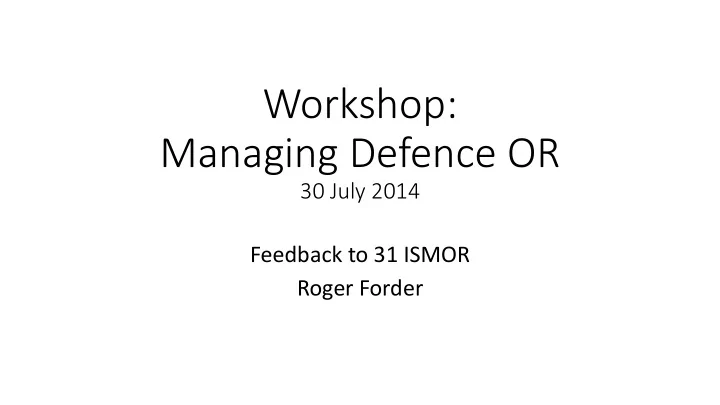

Workshop: Managing Defence OR 30 July 2014 Feedback to 31 ISMOR Roger Forder
Aim • Discuss practices, perceptions and experiences related to the management of OR groups that address defence issues • Identify how these differ between the different environments within which groups operate • Provide participants with food for thought • (Possibly) generate ideas for papers / activities at future ISMORs
Managing defence OR – the key questions • What capabilities and • How do we get the Capability & resources do we need? Tasking taskings that we • How do we acquire, resources need, want or maintain and develop believe desirable? them? Project • What’s different about a management (defence) OR project? • What are the implications of this? • What outcomes are we looking for? Outcome • What are the implications of this?
Managing defence OR – the key questions • What capabilities and • How do we get the Capability & resources do we need? Tasking How do the answers vary between: taskings that we • How do we acquire, resources need, want or • different types of group? maintain and develop believe desirable? • Government - embedded team them? • Government - arm’s length agency • Private sector - consultancy Project • What’s different about a • Private sector - embedded team within larger management (defence) OR project? • What are the implications of company • different nations? this? • What outcomes are we looking for? Outcome • What are the implications of this?
Plenty of f feedback in this process! Capability & Tasking resources Project management Outcome
What did id we talk lk about? Capability & Tasking resources Project management Outcome
Some key themes: C Capability and resources • ‘Suitably Qualified and Experienced People’ • Most groups rely heavily on recruitment of ‘new -to- OR’ at newish graduate / post-graduate level • Importance of soft skills and credibility when interacting with clients • Writing skills
Some key themes: C Capability and resources Contextual knowledge: military background, defence systems, current issues, client • ‘Suitably Qualified and Experienced People’ organization and processes … • Most groups rely heavily on recruitment of ‘new -to- OR’ at newish graduate / post-graduate level • Importance of soft skills and credibility when interacting with clients • Writing skills
Some key themes: C Capability and resources • ‘Suitably Qualified and Experienced People’ • Most groups rely heavily on recruitment of ‘new -to- OR’ at newish graduate / post-graduate level • Importance of soft skills and credibility when interacting with clients • Writing skills Attend military staff courses Work in client organizations Receive ruthless feedback Do reviews of other people’s writing Read widely and well Value of PhD / post-doc experience Mixed results from courses
Some key themes: C Capability and resources • ‘Suitably Qualified and Experienced People’ Innovative approaches using Sharepoint, wikis, social media, etc • Most groups rely heavily on recruitment of ‘new -to- OR’ at newish graduate / Short, sharp sharing / briefing events post-graduate level Audio / video records for staff ‘brain • Importance of soft skills and credibility when interacting with clients dumps’ • Writing skills • Knowledge management
Some key themes: C Capability and resources • ‘Suitably Qualified and Experienced People’ • Most groups rely heavily on recruitment of ‘new -to- OR’ at newish graduate / post-graduate level • Importance of soft skills and credibility when interacting with clients • Writing skills • Knowledge management • Strategic relationships and (in UK, at least) trend to consortium contracts
Taskings • (Obviously) no magic formula to getting the right taskings; commercially sensitive area! • Increased importance of bidding as consortia
Project management • Not like building a bridge - we may not know what we really have to do until we’ve almost done it! • Obviously, (again) no magic formula … • … but plenty of experience in coping with this that could be teased out and structured • Issues when working as part of a consortium
Working in a consortium • Pros • Economy in bidding • Brings together best capabilities from range of organizations – no need for everyone to be able to do everything • Facilitates contributions from ‘non - standard’ players – e.g. universities, think tanks. • Cons • Can promote stove-piping of capabilities and over-specialised staff – people and companies get used to just doing the same old bits and pieces; loss of ability to take the holistic view that is essential to good OR • Can result in isolation from direct interaction with client
In summary … • Some very interesting discussions, with range of perceptions and experiences … as well as the airing of well established consensus • Plenty of ground left to cover! • Should future ISMORs continue to try to bring in topics related to the professional practice of OR? If so, what form should they take?
Recommend
More recommend